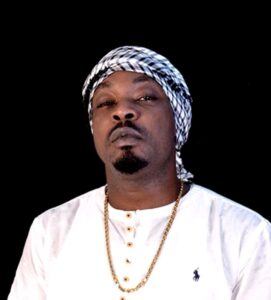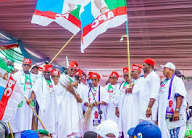NBC Bans Eedris Abdulkareem’s ‘Tell Ya Papa’ from Nigerian Airwaves

The National Broadcasting Commission (NBC) has banned Nigerian radio and television stations from airing “Tell Your Papa,” a newly released protest track by veteran rapper Eedris Abdulkareem.
The commission, in a directive dated April 9, 2025, labeled the song “Not To Be Broadcast” (NTBB), citing its perceived “objectionable nature” and invoking a specific provision of the Nigeria Broadcasting Code.
The memo, signed by Susan Obi, Coordinating Director of Broadcast Monitoring, references Section 3.1.8 of the sixth edition of the Nigeria Broadcasting Code, a clause that explicitly forbids content considered to be “obscene, vulgar, indecent, hateful, inciting, or otherwise unfit for public consumption.” It mandates that all broadcasters ensure that material aired does not offend public morality or undermine national unity.
The section further states that programming must “promote national interest, social harmony, and ethical values,” while avoiding expressions that could be seen as “disparaging or inflammatory toward individuals, government institutions, or national leaders.”
By this logic, the NBC determined that Abdulkareem’s song contains language and themes that violate these regulatory standards. The commission emphasized that although the track has garnered traction on social media, its lyrics are not fit for broadcast on terrestrial radio or television.
“Your cooperation and commitment to upholding responsible broadcasting is greatly appreciated,” the directive concludes.
Since its release on April 7, “Tell Your Papa” has gone viral online and stirred heated public discourse. The song is directly addressed to Seyi Tinubu, son of Nigerian President Bola Ahmed Tinubu, and delivers a scathing critique of the country’s deteriorating socio-economic conditions.
Abdulkareem charges Seyi with the responsibility of confronting his father on behalf of millions of suffering Nigerians, painting a grim picture of insecurity, inflation, poverty, and government inaction.
“Seyi, tell your papa country hard. Tell your papa people dey die. Tell your papa this one don pass jagajaga,” Abdulkareem raps in the opening verse, making a clear reference to his earlier hit, “Jaga Jaga,” which was itself banned by the government in 2004. The new song continues with barbed lines such as, “Try travel by road without your security make you feel the pains of fellow Nigerians,” and “You dey fly private jets, insecurity no be your problem.”
The track came in direct response to recent comments made by Seyi Tinubu during a public appearance in Adamawa State, where he described his father as “the greatest president in Nigeria’s history.” Abdulkareem’s song, filled with sarcasm and urgency, appears designed to challenge what many see as an elite detachment from the realities of ordinary Nigerians.
The NBC’s move to ban the song has reignited long-standing debates over censorship and the boundaries of artistic freedom in Nigeria. Critics argue that Section 3.1.8 is often used selectively to silence politically sensitive or dissenting content.
Free speech advocates and cultural commentators have warned that such actions pose a threat to democratic discourse and the right of citizens to hold their leaders accountable through art and satire.
Eedris Abdulkareem is no stranger to confrontation with the authorities. A pioneer of politically conscious music in Nigeria, he rose to prominence with tracks that criticized corruption, poor governance, and social injustice.
His 2004 single “Jaga Jaga,” which described Nigeria as chaotic and mismanaged, was famously condemned by then-President Olusegun Obasanjo.







